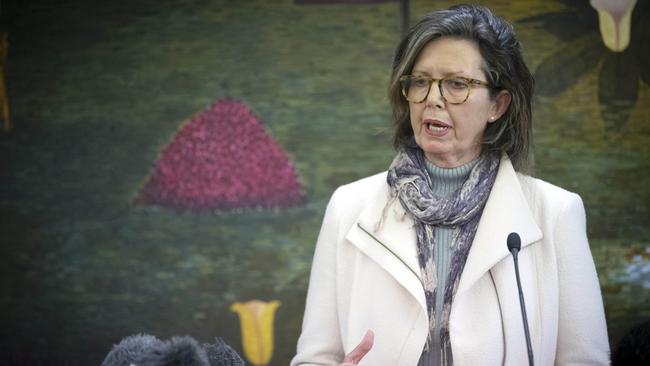Discrimination complaints on the rise
Anti-discrimination complaints have hit record highs in Tasmania as the state’s commissioner laments a global decline in compassion and kindness. Here’s five examples.

Tasmania
Don't miss out on the headlines from Tasmania. Followed categories will be added to My News.
Complaints about unlawful discrimination have hit record highs in Tasmania as the state’s Anti-Discrimination Commissioner laments a global decline in compassion and kindness.
Commissioner Sarah Bolt’s annual report for 2023/24 revealed a 27 per cent increase in complaints.
There were 242 complaints made last financial year, containing 333 allegations of discrimination; 294 of conduct that offends, humiliates, intimidates, insults or ridicules; and 148 of victimisation.
Ms Bolt said the results in Tasmania came as wars raged in Ukraine and Gaza and rightful outrage was “dulled by constant exposure to tragedy”.
“Across the global stage, the violation of human rights is like a runaway train,” she wrote.
“What begs the question then is why many people in the ‘lucky’ country find themselves subjected to discrimination, sexual harassment, homelessness, sexual violence and other anti-social behaviour, and how these issues might be remedied.
“I lament the growing intolerance, declining compassion and victim-blaming discourse which seems to be spreading through public debate on these issues.
“Why, as a matter of personal and professional daily practice, is it seemingly so difficult to show kindness, empathy and respect toward each other regardless of any attributes we possess?”

Anti-Discrimination Act allows complaints to be raised about discrimination on the basis of one or more of 22 protected attributes including race, age, sexual orientation, lawful sexual activity, gender, gender identity, sex characteristics, marital status and relationship status.
Disability discrimination was the most common cause of complaint, followed by race, gender and age.
Most complaints came from individuals, with a roughly even split of male and female complainants.
The report included case studies of employers being unwilling to make reasonable accommodations for staff with disabilities, or staff raising issues with verbal abuse, problems with access to disabled parking and a patron refused entry to a hotel because of facial tattoos.
Of their 214 complaints, 141 were accepted for assessment in whole or in part.
Ms Bolt wrote that she hoped the increase in complaints reflected a greater awareness and said she was grateful for the opportunity to work to help make Tasmania a safer, kinder and more equitable community.
“The increasing numbers of complaints and reports received do, I think, reflect a greater trust and understanding, across the community, of the complaint processes under the Anti-Discrimination Act,” she wrote.
“In 2024-25 it is my hope that Tasmanians see strides taken by individuals, community groups and Government, to address racially motivated violence, violence against women and other forms of gender inequality, accessibility and inclusion of people with disability and the LGBTIQA+ community, elder abuse, and forms of discrimination and abuse against other attribute groups, in new and inspired ways.”
Snapshot of complaints
Case 1
A person made a complaint of discrimination on the basis of pregnancy, disability and sexual harassment alleging their employer told other workers that they had terminated a pregnancy and made sexual jokes and comments to them. After conciliation, the employer apologised and paid $25,000 in compensation.
Case 2
An employer texted a female apprentice with an image of her as a teenager and said “look at this hottie”, included kiss signs ‘x’ and emojis, made explicit comments about her physical appearance, described her as a ‘s**t’, commented on her race and other conduct. The employer agreed pay compensation and undertake training and to provide staff training and review their policies and procedures.
Case 3
A worker alleged they were called a “little short black c*** by a co-worker and that after they complained to their employer, their employment conditions changed and pay were reduced. The parties reached an agreement, including payment of compensation.
Case 4
A transgender woman complained of being excluded from an international sporting competition by organisers. The decision was reviewed, organisers allowed the woman to compete and the complaint was withdrawn.
Case 5
A person excluded from a club because they were “not comfortable” being present during an Acknowledgement of Country” complained they were being discriminated against on the basis of their political beliefs. They said they liked certain politicians considered to be “conservative”, and believed in “Cancel Culture”. The Anti-Discrimination Commissioner rejected the complaint because she was not satisfied the complainant’s beliefs were
political.



